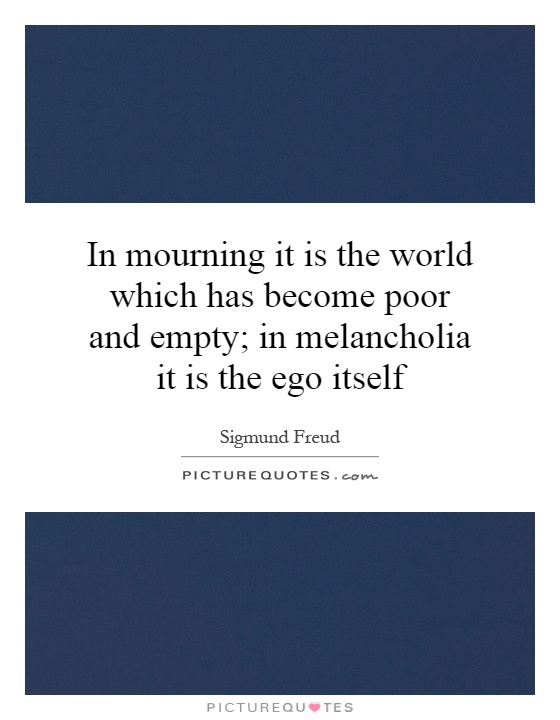In mourning it is the world which has become poor and empty; in melancholia it is the ego itself

In mourning it is the world which has become poor and empty; in melancholia it is the ego itself
Sigmund Freud, the father of psychoanalysis, made significant contributions to our understanding of grief and mourning. One of his most famous concepts is the distinction between mourning and melancholia. In mourning, the individual experiences a sense of loss and sadness due to the death of a loved one or the end of a significant relationship. However, in melancholia, the individual experiences a deeper sense of emptiness and self-loathing.Freud believed that in mourning, the world becomes poor and empty because the individual is grieving the loss of someone or something external to themselves. The focus is on the external object that has been lost, and the individual is able to eventually come to terms with the reality of the loss and move on. In this process, the individual is able to mourn the loss and eventually let go of the attachment to the lost object.
On the other hand, in melancholia, the ego itself becomes impoverished and empty. The individual internalizes the loss and turns their anger and sadness inward, towards themselves. This self-directed anger and sadness can lead to feelings of worthlessness, guilt, and self-hatred. The individual may struggle to understand why they feel so empty and may not be able to identify the source of their pain.
Freud believed that melancholia is a more complex and challenging process than mourning because it involves a deeper sense of loss and self-reflection. The individual may struggle to separate their own identity from the lost object, leading to a sense of confusion and despair. In order to overcome melancholia, the individual must work through their feelings of self-loathing and come to terms with their own sense of loss and emptiness.
Overall, Freud's concept of mourning and melancholia highlights the importance of understanding the different ways in which individuals experience grief and loss. By recognizing the differences between mourning and melancholia, individuals can better navigate the complex emotions that come with loss and ultimately find healing and resolution.












 Friendship Quotes
Friendship Quotes Love Quotes
Love Quotes Life Quotes
Life Quotes Funny Quotes
Funny Quotes Motivational Quotes
Motivational Quotes Inspirational Quotes
Inspirational Quotes